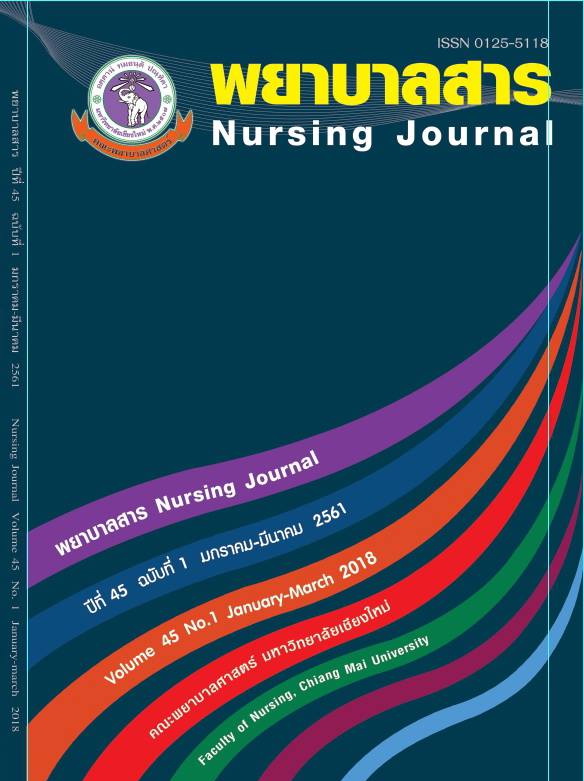ทัศนคติต่อการบอกความจริงเกี่ยวกับการวินิจฉัยโรคและการพยากรณ์โรคของผู้ที่เป็นมะเร็ง
คำสำคัญ:
การบอกความจริง, การวินิจฉัยโรค, การพยากรณ์โรค, ผู้ที่เป็นมะเร็งบทคัดย่อ
การบอกความจริงเกี่ยวกับการวินิจฉัยโรคและการพยากรณ์โรคในผู้ที่เป็นมะเร็งเป็นประเด็นที่ท้าทายสำหรับบุคลากรด้านสุขภาพ โดยเฉพาะอย่างยิ่งในประเทศที่ให้ความสำคัญกับครอบครัวอย่างประเทศไทย ทัศนคติต่อการบอกความจริงเกี่ยวกับการวินิจฉัยโรคและการพยากรณ์โรคของผู้ที่เป็นมะเร็งจำเป็นสำหรับการพัฒนาคุณภาพการปฏิบัติทางคลินิก การวิจัยเชิงพรรณนาครั้งนี้มีวัตถุประสงค์เพื่อศึกษาทัศนคติต่อการบอกความจริงเกี่ยวกับการวินิจฉัยโรคและการพยากรณ์โรคของผู้ที่เป็นมะเร็ง กลุ่มตัวอย่างจำนวน 377 ราย เลือกมาอย่างเฉพาะเจาะจงจากผู้ที่เป็นมะเร็งที่รับการรักษาในโรงพยาบาลมะเร็งแห่งหนึ่ง ระหว่างเดือนมีนาคมถึงเดือนพฤษภาคม พ.ศ. 2558 รวบรวมข้อมูลโดยใช้แบบสอบถามทัศนคติต่อการบอกความจริงเกี่ยวกับการวินิจฉัยโรคและการพยากรณ์โรคที่ผู้วิจัยสร้างขึ้น แบบสอบถามประกอบด้วย 3 องค์ประกอบของทัศนคติ คือ 1) ด้านความเข้าใจ 2) ด้านอารมณ์ความรู้สึก และ 3) ด้านพฤติกรรมปฏิบัติ วิเคราะห์ข้อมูลด้วยสถิติเชิงพรรณนา
ผลการศึกษาพบว่า
1. สำหรับทัศนคติต่อการบอกความจริงเกี่ยวกับการวินิจฉัยโรค กลุ่มตัวอย่างร้อยละ 98.40 มีคะแนนทัศนคติโดยรวมอยู่ในระดับสูง กลุ่มตัวอย่างส่วนใหญ่มีคะแนนทัศนคติอยู่ในระดับสูงในด้านความเข้าใจ (ร้อยละ 98.93) ด้านอารมณ์ความรู้สึก (ร้อยละ 89.12) และด้านพฤติกรรมปฏิบัติ (ร้อยละ 96.29)
- สำหรับทัศนคติต่อการบอกความจริงเกี่ยวกับการพยากรณ์โรค กลุ่มตัวอย่าง ร้อยละ 96.82 มีคะแนนโดยรวมอยู่ในระดับสูง กลุ่มตัวอย่างส่วนใหญ่มีคะแนนทัศนคติอยู่ในระดับสูงทั้งด้านความเข้าใจ (ร้อยละ 96.29) ด้านอารมณ์ความรู้สึก (ร้อยละ 82.76) และด้านพฤติกรรมปฏิบัติ (ร้อยละ 94.96)
ผลของการวิจัยครั้งนี้ แสดงถึงทัศนคติที่ดีต่อการบอกความจริงเกี่ยวกับการวินิจฉัยโรคและการพยากรณ์โรคของผู้ที่เป็นมะเร็ง ซึ่งควรประเมินความต้องการและทัศนคติของผู้ที่เป็นมะเร็งก่อนที่ตัดสินใจสู่การปฏิบัติทางคลินิก การวิจัยครั้งต่อไปควรมีการค้นหาวิธีการที่เหมาะสมในการบอกความจริงเกี่ยวกับการวินิจฉัยโรคและการพยากรณ์โรคแก่ผู้ที่เป็นมะเร็งต่อไป
คำสำคัญ: การบอกความจริง การวินิจฉัยโรค การพยากรณ์โรค ผู้ที่เป็นมะเร็ง
เอกสารอ้างอิง
ชัชปวิตร เกตุพุก. (2546). การบอกความจริง. สงขลานครินทร์เวชสาร, 21(3), 223-229.
ปราณี ช่วงไกล. (2546). การปฏิบัติกิจกรรมเพื่อพิทักษ์สิทธิผู้ป่วย ตามการรับรู้ของผู้ป่วยอายุรกรรมหญิง โรงพยาบาลพิจิตร. วิทยานิพนธ์ปริญญาพยาบาลศาสตรมหาบัณฑิต สาขาวิชาการบริหาร การพยาบาล บัณฑิตวิทยาลัย มหาวิทยาลัยเชียงใหม่.
วิชัย โชควิวัฒน์. (2555). หลักการสำคัญในการดูแลรักษาผู้ป่วยระยะสุดท้ายแบบประคับประคอง. ใน ไพศาล ลิ้มสถิตย์ และอภิราชย์ ขันธ์เสน (บรรณาธิการ). ก่อนวันผลัดใบ: หนังสือแสดงเจตนาการ จากไปใน วาระสุดท้าย. (พิมพ์ครั้งที่ 5, หน้า 25-38). นนทบุรี: สำนักงานคณะกรรมการสุขภาพ แห่งชาติ.
สภาการพยาบาล. (2555). สิทธิของผู้ป่วย [Electronic version]. Retrieved October 10, 2013, from http://www.tnc.or.th/law/page-5.html
Al-Amri, M. (2010). Saudi cancer patients’ attitudes towards disclosure of cancer information [Electronic version]. Middle East Journal of Cancer, 1(4), 175-180. Retrieved October 10, 2013, from http://www.sid.ir/en/VEWSSID/J_pdf/1001520100405.pdf
Alifrangis, C., Koizia. L., Rozario, A., Rodney, S., Harrington, M., Somerville, C., Peplow, T. & Waxman, J. (2011). The experiences of cancer patient. Journal of the Association of Physicians,104(12),
1075-1081. doi: 10.1093/qjmed/hcr129
Chiu, L., Lee, W. D., Gao, F., Parker, P. A., Ng, G., & Toh, C. (2006). Cancer patients’ preferences for communication of unfavorable news: An Asian perspective. Support Care Cencer, 14(8), 818- 824. doi: 10.1007/s00520-005-0911-7
Doumit, M. A. A. & Abu-Saad, H. H. (2008). Lebanese cancer patients: Communication and truth telling preferences. Contemporary Nurse: A Journal for the Australian Nursing Profession, 28(1-2): 74-82. doi: 10.5172/conu.673.28.1-2.74
Erer, S., Atici, E. & Erdemir, A. D. (2008).The views of cancer patients on patient rights in the context of information and autonomy. Journal of Medical Ethics, 34(5), 384-388. doi: 10.1136/jme.2007.020750.
Fumis, R. R., Camargo, D. & Giglio A. (2012). Physician, patient and family attitudes regarding information on prognosis: a Brazilian survey. Journal of the European Society for Medical Oncology, 23(1). 205-211. doi: 10.1093/annonc/mdr049
Guven, T. (2010). Truth-telling in cancer: Examining the cultural incompatibility argument in Turkey. Nursing Ethics, 17(2), 159-166. doi: 10.1177/09697333009352046
Hoff, L., Tidefelt, U., Thaning, L., & Hermeren, G. (2007). In the shadow of bad news views of patients with acute leukaemia, myeloma or lung cancer about information, from diagnosis to cure or
death. BMC Palliative Care; 6(1), 1-8. doi: 10.1186/1472-684x-6-1
Jawaid, M., Qamar, B., Masood, Z., & Jawaid, S. (2010). Disclosure of cancer diagnosis : Pakistani patients’ perspective[Electronic version]. Middle East Journal of Cancer, 1(2), 89-94. Retrieved October 10, 2013, from http://mejc.sums.ac.ir/index.php/mejc/article/viewFile/99/89
Jiang, Y., Lie, C., Li, J., Huang, M., Yao, W., Zhang, R., ... Wei, Y. (2007). Different attitudes of Chinese patients and their families toward truth telling of different stages of cancer. Psycho-Oncology, 16(10), 928-936. doi: 10.1002/pon.1156
Motlagh, A., Yaraei, N., Mafi, A. R., Hosseini Kamal, F., Yaseri, M., Hemati, S.,…Akbari, M. E. (2014). Attitude of cancer patients toward diagnosis disclosure and their preference for clinical decision-making: a national survey. Archives of Iranian medicine, 17(4), 232- 240. doi: 014174/AIM.004
Perera, M. C., Tennakoon, T. M., Kumarasiri, L. A., Jayasinghe, S. N., Rathnayake, R. m. & Rajapaksha, R. M. (2013). Cancer in Sri Lanka: The question of, “To tell or not to tell”. Journal of Otolaryngology, 3(1), 17-19. doi: 10.4038/cjo.v3i1.5213
Phungrassami, T., Sriplung, H., Roka, A., Mintrasak, E., Peerawong T., Aegem, U. (2003). Disclosure of a cancer diagnosis in Thai patients treated with radiotherapy. Social Science Medical Journal, 57(9), 1675-1682. doi: 10.1016/S0277-9536(02)00552-X
Shahidi, J. (2010). Not telling the truth: Circumstances leading to concealment of diagnosis and
prognosis from cancer patients. European Journal of Cancer Care, 19(5), 589-593.
doi: 10.1111/j.1365-2354.2009.01100.x
Surbone, A. (2006). Telling the truth to patients with cancer: What is the truth ? The Lancet Oncology, 7(11), 944-950. doi: 10.1016/S1470-2045(06)70941-X
Tang, S. T., Liu T., Lai, M., Liu, L., Chen, C. & Koong, S. (2006). Congruence of Knowledge, Experiences, and Preferences for Disclosure of Diagnosis and Prognosis between Terminally-Ill Cancer Patients and Their Family Caregivers in Taiwan. Cancer Investigation, 24(4), 360-366. doi:10.1080/07357900600705284
Tattersal, M. H. (2010). Truth telling and consent. In G. Hanks, N. I. Cherny, N. A. Christakis, M. Fallon, S. Kaasa, & R. K. Portenoy (Eds.), Oxford textbook of Palliative medicine (4th ed., pp. 290-295). New York: Oxford University press.
Tieying, A., Haishan, H., Meizhen, Z., & Yan, L. (2011). Health professionals’ attitude towards information disclosure to cancer patients in China. Nursing Ethics, 18(3), 356-363. doi: 10.1177/0969733011398096
Triandis, H. C. (1971). Attitude and attitude change. In D. Katz (Series Ed.), Wiley foundations of social psychology series, (pp. 60-101). Canada: John Wiley & Sons.
Valizadeh, L., Zamanzadeh, V., Pahmani, A., Howard, F., Nikanfar, A., & Ferguson, C. (2012). Cancer disclosure: Experiences of Iranian cancer patients. Nursing and Health Sciences, 14, 250-256. doi: 10.1111/j.1442-2018.2012.00686.x
Wang, D., Guo, C., Peng, X., Su, Y., & Chen, F. (2011). Is therapeutic non-disclosure still possible? A study of the awareness of cancer diagnosis in China. Support care cancer, 19(8), 1191-1195. doi: 10.1007/s00520-010-0937-3
Wood, W. A., McCabe, M. S., & Goldberg, R. M. (2009). Commentary: disclosure in oncology to whom does he truth belong? The Oncologist, 14(1), 77-82. doi: 10.1634/theoncologist.2008-0158
World Health Organization. (2013). Fact Sheet on Cancer [Electronic version]. Retrieved October 10, 2013, from http://globocan.iarc.fr/Pages/fact_sheets_cancer.aspx
Translated Thai References
Ministry of Public Health. (2013). Public Health Statistics. [Electronic version]. Retrieved July 8, 2014, from http://social.nesdb.go.th/SocialStat/StatLineChart_Final.aspx?reportid=367&template= 1R2C&yeartype=M&subcatid=15 (In Thai)
Getpook, C. (2003). Truth telling. SongKlanagarind Medical Journal, 21(3), 223-229. (In Thai)
Chaungkai, Prenee ( 2003). Practices on Activities Concerning Patients Advocacy Perceived by
Administration, Graduate School, Chiang Mai University. (In Thai)
Thailand Nursing and Midwifery Council. (2012). Patient's Right. [Electronic version]. Retrieved
October 10, 2013,from http://www.tnc.or.th/law/page-5.html (In Thai)
ดาวน์โหลด
เผยแพร่แล้ว
รูปแบบการอ้างอิง
ฉบับ
ประเภทบทความ
สัญญาอนุญาต
บทความที่ได้รับการตีพิมพ์เป็นลิขสิทธิ์ของวารสารพยาบาลสาร
ข้อความที่ปรากฏในบทความแต่ละเรื่องในวารสารวิชาการเล่มนี้เป็นความคิดเห็นส่วนตัวของผู้เขียนแต่ละท่านไม่เกี่ยวข้องกับมหาวิทยาลัยเชียงใหม่ และคณาจารย์ท่านอื่นๆในมหาวิทยาลัยฯ แต่อย่างใด ความรับผิดชอบองค์ประกอบทั้งหมดของบทความแต่ละเรื่องเป็นของผู้เขียนแต่ละท่าน หากมีความผิดพลาดใด ๆ ผู้เขียนแต่ละท่านจะรับผิดชอบบทความของตนเองแต่ผู้เดียว






